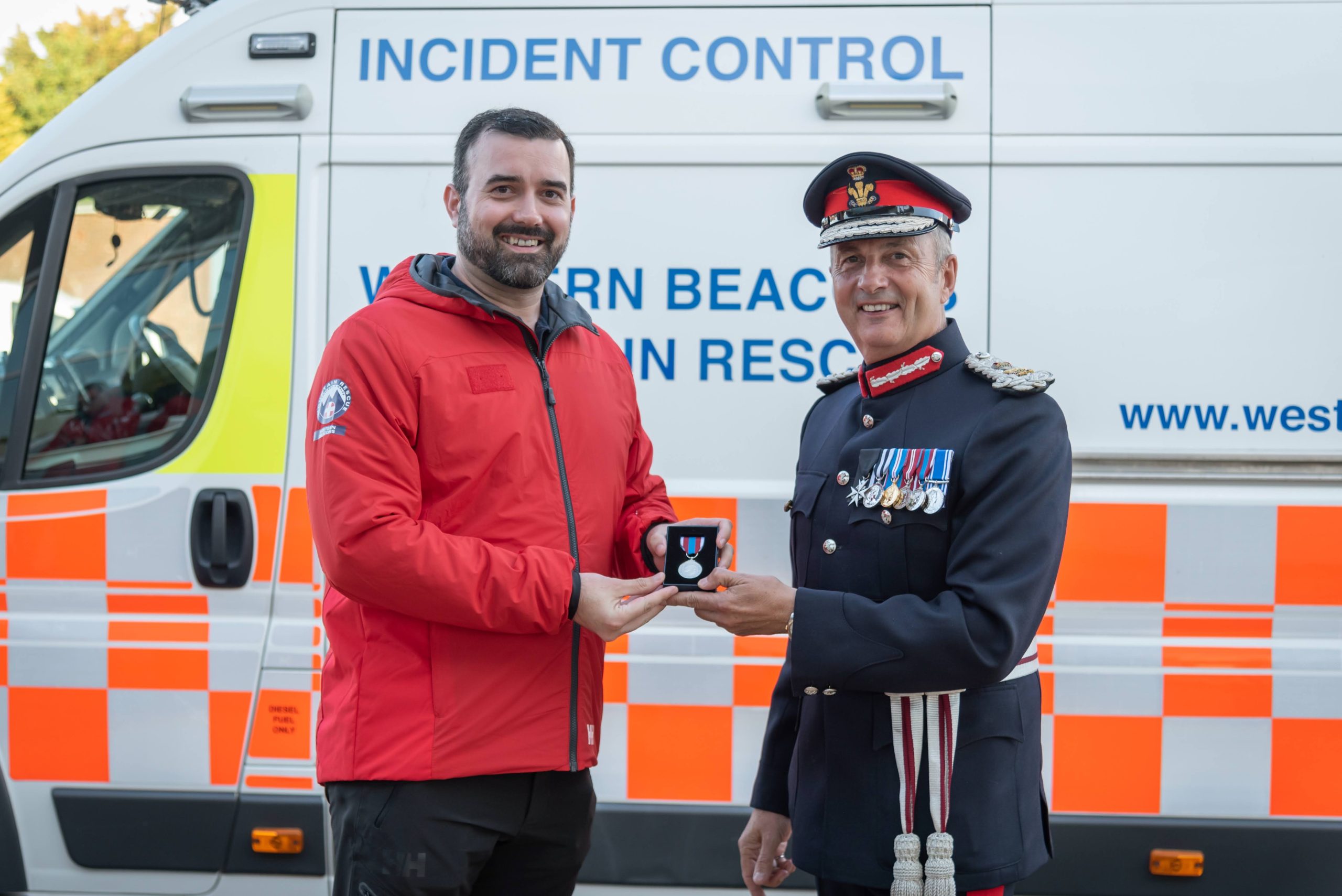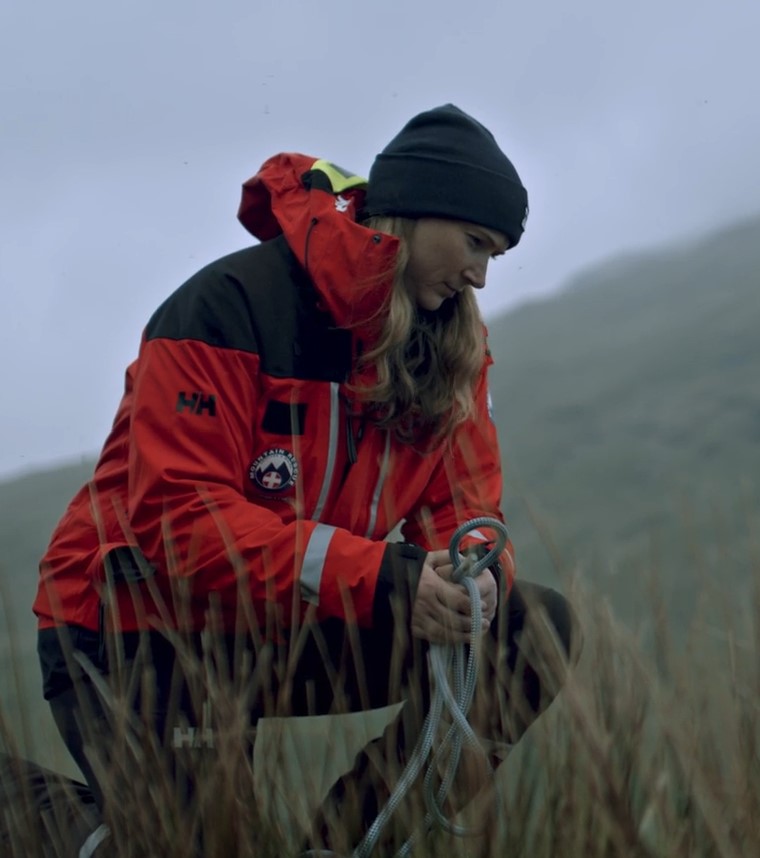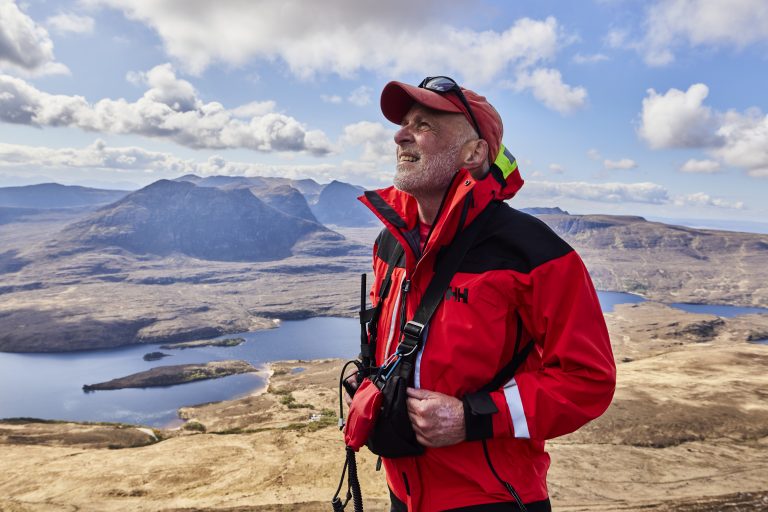This interview with Mountain Rescue was facilitated by Helly Hansen and originally published in Wired For Adventure Volume 20.
Tell us your name, age, how long you’ve been part of Mountain Rescue, your region, and your favourite local adventure?
Gavin Findlay, Arrochar: I’m 58 with more than 15 years in Mountain Rescue. One of my favourite local “must-dos” is a winter ascent of Y-Gully on Cruach Ardrain. Walking through forests and a beautiful, secluded corrie, usually with wildlife to admire with my climbing partner – Siberian Husky Bella Koda. The route is Grade 1, but oft times I’m led onto steeper bits by said climbing partner.
Will Oliver, Western Beacons: I’m 44 years old and have been in Mountain Rescue for 11 years. I am Deputy Team Leader in the Western Beacons Team that covers a large area of West, Mid and South Wales. My favourite local adventure involves either getting out into the remote areas to the West of the Swansea valley or instructing on water and flood rescue in our local inland waterways.
Charlie Macleod, Assynt: I have been in Mountain Rescue for going on 15 years as a team member and SARDA dog handler. I live in the far North of Scotland about 25 miles south of John o’ Groats. With SARDA I can be called out literally anywhere in Scotland and travel times of 5 hours or more would not be that unusual. My favourite local adventure would be rock climbing on my local sea cliffs and putting up new routes. My coastline also has world class sea kayaking with mile after mile of caves, arches and Geos.
Vicky Watson, North Tyne: I have been in North of Tyne Mountain Rescue Team for a little over one year. My most recent adventure was caving as a social activity with some of the team. We abseiled into a cave and used a single rope technique (SRT) to ascend. What an amazing experience!
Talk us through a day in the life as part of Mountain Rescue.
Will: As volunteers we all have other commitments, whether that be family, work or other aspects. We ensure we spend a considerable amount of time training, so that when a callout comes in, we are ready to respond whatever the time or weather. We are on call 24 hours a day, 365 days a year. A day could involve planning training or other events, being at training on a weeknight or over a weekend. It could be leaving work to respond to a callout. Mountain Rescue is a serious commitment but the value of giving something back to communities and those we help is why we all sign up to do it.
Why did you join mountain rescue?
Charlie: I joined for a variety of reasons. My prime motivator was to put my skills and knowledge to good use to help others. I had to be rescued many years ago when a winter ascent of the North face of the Matterhorn resulted in the tragic death of my climbing partner just below the summit. I have an insight into what that feels like having been on the receiving end. Sometimes bad things just happen. Being able to help others in the mountains when they need it is a privilege.
 Growing up, Will spent all of his spare time in Snowdonia
Growing up, Will spent all of his spare time in Snowdonia
What skills are essential for being part of Mountain Rescue?
Charlie: The beauty about being part of a team is that we can all bring our particular strengths to the table. There is no real ‘cookie cutter’ template for a MRT volunteer. What you do need is a basic skill set, know how to navigate and the ability to look after yourself outdoors, including in bad or challenging conditions. More than anything however, the right attitude and motivation along with an enthusiasm to learn. A good sense of humour doesn’t hurt nor does an ability to work in a team.
What is training like?
Gavin: The requirement is broad-ranging, and to progress commitment is essential. One of the big things is that besides one’s own kit, one must carry team kit. Physical fitness is an essential. Beyond that, the ability to move in all weathers with said heavy load comes into play. Training covers: basic hill skills (movement on steep ground, navigation); rescue skills (lowers, back-roping, securing casualties); medical skills (basic first aid through to paramedic-level); summer and winter capabilities; use of vehicles, communications etc. Experience must be developed and skills learned, refreshed and practiced. All skills are perishable, and must be practiced, honed and developed.
How has Mountain Rescue changed since you’ve been a part of it and how is it changing now?
Gavin: As medical techniques change, we aim to mirror the capabilities of the NHS via team doctors and paramedics. Improved navigation and the use of drones have been added – whilst each has advantages, they also have limitations. So whilst there may be im- proved/different tools in the box, the basic core mountain skills are consistent, and weather/conditions/battery life can limit any system. A fit mountaineer or a doggie with a good nose are the key attributes for safely operating and recovering those in need.
 Gavin was introduced to hill walking by his father
Gavin was introduced to hill walking by his father
What should be in a mountain first aid kit
Gavin: As a minimum blister kit/plasters/tape. Most injuries are lower leg or cuts/grazes, thus the ability to clean a wound, stop bleeding and relieve pain is the best starting point. Many companies offer comprehensive 1st aid kits as starters. But all of that is useless without some knowledge and basic skills to use effectively. Everything starts with knowledge. Take a training course on First Aid.
Charlie: and… if ever you give meds to others you must check for safety and appropriateness. If you’re unsure, phone a medical service for advice.
Should people be afraid of heading out into the mountains?
Will: Absolutely not. The natural environment we have in this country is amazing. It would be good for people to ensure they are prepared by knowing how to navigate, taking a paper map, a compass, and a few torches or headlights with spare batteries. Having some basic preparation and understanding of the risks would help you to enjoy these areas even more.
What’s the number one most important thing people should remember before setting off for an adventure?
Vicky: Be prepared in every respect – the kit you carry, route planning, including options, and weather.
 Vicky finds the outdoors a great switch off from her busy day job
Vicky finds the outdoors a great switch off from her busy day job
What do you wish people knew about adventuring in the mountains/moorlands that few people do?
Vicky: It really is for everyone. A lot of people rule it out for themselves for many reasons and if you want to do it you should give it a go. Start small and build up.
In the case of an emergency, what steps should people follow to seek rescue?
Will: Stay somewhere safe and know your location to share if you can. Call 999 asking for the Police and ask for Mountain Rescue. You may get sent a text message with a link from Mountain Rescue, if you are able to receive this, follow the instructions as this will help us to know your location.



